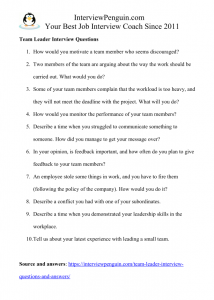Small team is a basic structural unit of most corporations. Each team needs a leader, someone who sets the directions, motivates people to work hard, monitors their performance in job, and solves problems and conflicts as they arise on a daily basis. Can it be you?
We will look at some questions the interviewers use to test your ability to lead a team. Bear in mind that personal and behavioral questions will be the same in each team leader interview. Regardless of whether you lead a group of construction workers, flight attendants, waitresses, call center operators, or assembly line workers, you’ll have the same duties as a leader. Logically the scenario-based questions are always similar. What will differ from one interview to another, however, are the technical questions. Leaders of modern teams often participate in the daily work. A lead receptionist still attends the front desk, and a leader on a building site has to know something about construction work…
In this article, however, we will focus on the non-technical questions–questions that test your team leading skills. To see technical questions for various positions, please navigate to interview questions by job title section. Okay, let’s look at the questions!
Table of Contents
How would you motivate a team member who seems discouraged to work hard?
You should suggest having a chat with them, understanding what bothers them, and whether they do not experience health issues or some personal problems (that lead to loss of motivation). Show the interviewers that you are a good listener, and try to understand the root of the problem before trying to address it.
Then you can talk about various ways of motivating people, such as simply encouraging them by a good word (or by a bad one), helping them to see the connection of the goals of the team and their personal goals, getting personally involved in work to be a good role model for them, etc.
Two members of the team are arguing about the way the work should be carried out. What would you do?
You are the leader, and you should take the responsibility. At the same time, however, it is important to allow the workers to keep their dignity, and to feel that they have been heard out.
Say that you would listen to both of them, thank them for their suggestions, and just then tell them how the work should be done. You would also instruct them that next time when they are not sure they should consult you, and not argue with one another.
In real life, these conflicts situations are hard to address, and your suggestion may not work. But your goal in an interview is to show the right attitude to conflict situation. Whether your resolution would work in practice is not so important…
Some of your team members complain that the workload is too heavy, and they will not meet the deadline with the project. What will you do?
If more people complain, it is difficult to make them change their mind. But deadlines are important in every corporation, and as a team leader you should try your best to ensure you’ll meet them. A creative answer ( one that will surprise many interviewers) is saying that you will go by an example, join the team, and stay in work late. People will see that you try hard, and will be motivated to try harder. This attitude works wonders in many real situations.
Another way is simply encouraging the people, or again explaining them how meeting the deadline is important not only for the company, but also for them, for their personal goals. If nothing from the above mentioned worked, you can suggest requesting a temporary relocation of a person from another team, to help your team meet the important deadline.
* May also interest you: Teamwork interview questions and answers.
How would you monitor the performance of your team members?
Big corporations typically have systems of performance appraisals in place, and you will simply use them in your job. But smaller companies depend on your creativity–you should design these systems.
You should say that you will try to set weekly, monthly and yearly goals for each employee in a team, or that you suggest using a software that monitors their activity while they work on a computer, and later you can check what they were doing in work.
In more simple jobs you can refer to your excellent observations skills, and simply always being present, and monitor the performance of each worker “on the go”. If you have experience with any particular performance appraisal systems from your previous jobs, explain them to the interviewers.
Special Tip: Download the full list of interview questions in a one page long PDF, and practice your answers anytime later:

Describe a time when you struggled to communicate something to someone. How did you manage to get your message over?
Not every member in your team will be as intelligent as you, and some people may even pretend to not understand you–when they do not like your message, or want to avoid following your instructions.
Show the interviewers that you count with this aspect of the job, and are ready to step out of your comfort zone and adjust your language and presentations to the intelligence and mood of the message recipient. Using demonstration, pictures and charts to help them understand things is also a great way to get your message over.
* Do not forget to read also: Leadership interview questions – Learn how to convince the interviewers of your leadership skills.
In your opinion, is feedback important, and how often do you plan to give feedback to your team members?
Feedback isn’t only important–it is essential for every good organization. You should say that you plan to give feedback to your subordinates daily. You won’t only criticize them though. On the contrary, if someone deserves a compliment, you will always give it to them. Emphasize the importance of recognizing quality work of your colleagues.
What is more, feedback from your employees is equally important. Say that you are receptive to feedback, and will even encourage your subordinates to give feedback on your work. Best team leaders know what their workers think about them, and how they feel in their job. This helps them to work effectively with each team member.
An employee stole some things in work, and you have to fire them (following the policy of the company). How would you do it?
Show empathy in your answer. Surely, if someone stole something we have to lay them off, but it doesn’t mean that we have to be harsh with them.
Say that you will clearly explain why you are firing them. You may even say that you’d thank them for the work they did for the business. You should explain the next steps, and calmly do the necessary paperwork with the employee, or refer them to the HR Generalist who will handle the paperwork…
Other tricky team leader interview questions
- What role do you play in a team?
- Are you a leader, or a follower?
- How would you describe your management style?
- How would you describe your communication skills?
- What is the most competitive situation you’ve experienced in a team environment?
- Describe the situation in which you were able to use persuasion to successfully convince someone.
- Tell us about a conflict you had with someone in the team.
- Tell us about a time you showed initiative.
- ….
* Special tip: Not sure how to answer the behavioral questions, “tell us about a time when…”, “describe a situation…”, etc? Have a look at our Interview Success Package, where you’ll find up to 10 brilliant answers to more than 100 interview questions, including 30+ behavioral questions–basically everything a hiring manager can throw at you in an interview for a Team Leader job. Thank you for checking it out!
Final thoughts
You will face mostly two types of questions in your team leader interview. The behavioral (situational) questions that refer to your ability to lead the team, and to address various situations and problems that occur in the workplace, or directly in within the team.
Second group will consist in technical questions, questions that relate to a particular job field (construction, aviation, automotive, marketing, sales, etc). In any case, team leader is a fancy job title, and you will almost always compete with many other people for the job. Try to prepare for the questions you may face, and do not forget to do a good research about your future employer. I hope you will succeed, and wish you best of luck!
Matthew
May also interest you:
- Teamwork interview questions – While leading a team you still work in a team. Learn how to answer question that relate to your ability to work within a team of people.
- Are you a leader, or a manager?
- Behavioral interview questions and answers.


